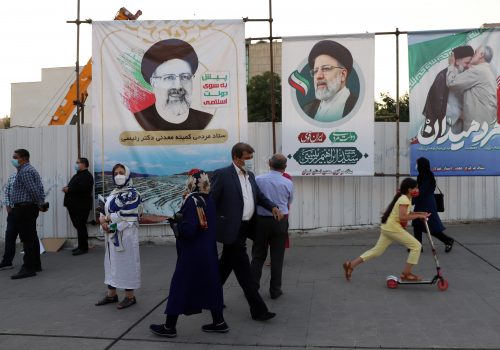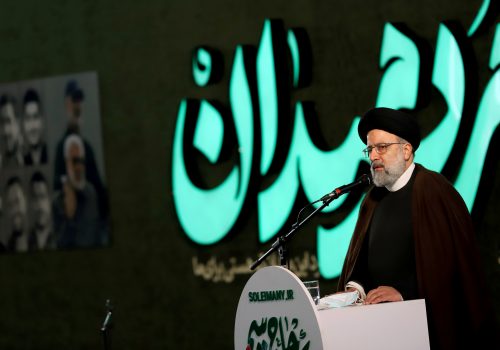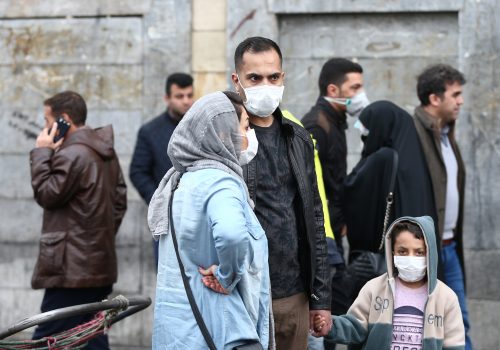FAST THINKING: Iran’s chosen one
JUST IN
It was never in doubt… really. Hard-line Judiciary Chief Ebrahim Raisi was elected president of Iran, trouncing a field handpicked by Supreme Leader Ayatollah Ali Khamenei. In fact Raisi, who will replace the more moderate Hassan Rouhani, is a top contender to become Iran’s next supreme leader. How will Raisi steer Iran? Does Friday’s low voter turnout spell trouble for him? Will he blow up chances at a revived nuclear deal with international powers? Our Iran experts are here to break down the preordained election.
TODAY’S EXPERT REACTION COURTESY OF
- Holly Dagres (@hdagres): Senior fellow at the Middle East programs and editor of IranSource
- Barbara Slavin (@barbaraslavin1): Director of the Future of Iran Initiative
- Matthew Kroenig (matthewkroenig): Deputy director of the Scowcroft Center for Strategy and Security
Rigged game
- Iran’s presidential candidates are selected by the supreme leader, who holds the final say on most everything. And even Raisi’s competitors conceded before the official results were announced, Holly points out. “His election wasn’t an election at all,” she says. “It was a coronation.”
- And for Raisi, age sixty, this is just a stepping stone to the real coronation. “Unlike [former hard-line president] Mahmoud Ahmadinejad, who clashed with Khamenei at times, Raisi has his eyes on the prize—succeeding Khamenei,” Barbara predicts.
- Matt points out that Freedom House ranks Iran as less democratic than Vladimir Putin’s Russia. Of Friday’s “elaborate sham” vote, he says: “It would be like if [former US President Donald] Trump remained in office in 2020 but held a nationwide election to determine whether [his daughter] Ivanka or Mike Pence should be the next vice president.”
- Many voters felt the same way. The turnout of less than 50 percent was the lowest in the history of the Islamic Republic and included millions of spoiled ballots. “Iranian officials will blame the pandemic, malfunctioning electronic ballots, diaspora satellite channels, and everything under the sun; but, in reality, this election outcome was of their own making,” Holly argues.
- That’s because many Iranians “have developed a growing list of grievances against all political factions—reformists, moderates, and hard-liners,” she adds, from the poor economy and corruption to repression and the “inability to deliver on promises of real change.”
Subscribe to Fast Thinking email alerts
Sign up to receive rapid insight in your inbox from Atlantic Council experts on global events as they unfold.

Deal with the great Satan?
- Raisi’s election signals that “an era of efforts by some influential factions in Iran to reconcile with the United States is coming to a close,” Barbara says. In fact Raisi is already under US sanctions for his role in executing political prisoners.
- And yet, Barbara adds, Tehran still wants to revive the Joint Comprehensive Plan of Action (JCPOA), the 2015 deal with the United States and other world powers to curb Iran’s nuclear aspirations. Iran needs the sanctions relief “to begin selling larger quantities of oil,” she says, “but the JCPOA will be the ceiling, not the floor, for US-Iran relations.”
- Matt agrees that Tehran will go forward with the deal, as indirect negotiations continue in Vienna, because it’s too good to pass up. “The deal will provide Tehran with massive sanctions relief and allow it to maintain a latent nuclear weapons capability with restrictions that begin to expire in only a few short years,” Matt points out.
The Raisi agenda
- Deal or no deal, Iran remains a “significant threat” to the United States and its allies, Matt argues. Aside from its nuclear program, Tehran will “possess the largest and most sophisticated ballistic missile program in the Middle East, be the world’s largest state sponsor of terrorism, and destabilize the region with proxy activity in Iraq, Syria, Lebanon, and Yemen,” he says.
- Barbara foresees a foreign-policy balancing act between regional powers and longtime foes. “Expect Raisi to deepen Iran’s economic ties to China, its strategic alliance with Russia, and its support for Shia militias in Iraq, Lebanon, and Syria,” Barbara says. “However, Iran is likely to continue its outreach to Saudi Arabia and to seek to reduce tensions, especially in Yemen, so that the Raisi government can concentrate on reviving Iran’s anemic economy.”
Further reading
Tue, Jun 15, 2021
The JCPOA but not much else: Modest expectations for US-Iran relations post Rouhani
IranElections2021 By Barbara Slavin
For the US and Iran, an Ebrahim Raisi presidency could portend not much beyond a return to a 2015 nuclear agreement that traded limited sanctions relief for time-bound curbs on Iran’s nuclear activities.
Tue, Jun 1, 2021
A Raisi presidential win may be his undoing as future Supreme Leader
IranSource By
Conventional wisdom is that the election will facilitate Ebrahim Raisi’s ascent to the real decision-making post in Iran—that of Supreme Leader. But nothing is ever certain in Iran’s contentious politics.
Tue, Mar 9, 2021
Middle class Iranians sought to remake their nation. Here’s how they were betrayed.
IranSource By Borzou Daragahi
There are broad continuities in the themes that have shaped Iran’s politics and society over the last century. The influence of Iran’s middle classes, who have at times aligned themselves with or steadfastly opposed those in power, has waxed and waned.
Image: Presidential candidate Ebrahim Raisi gestures after casting his vote during presidential elections at a polling station in Tehran, Iran, on June 18, 2021. Photo by Majid Asgaripour/WANA (West Asia News Agency) via Reuters.


